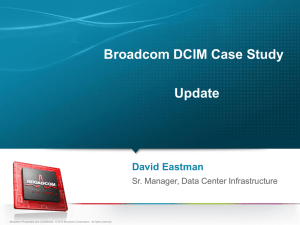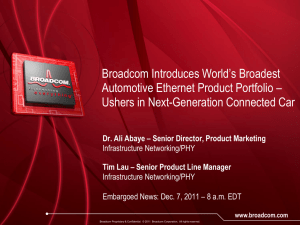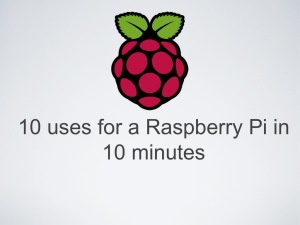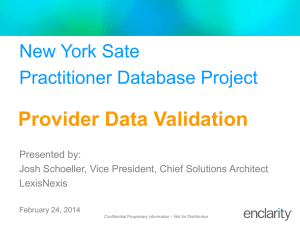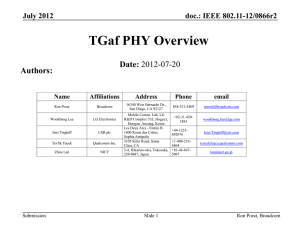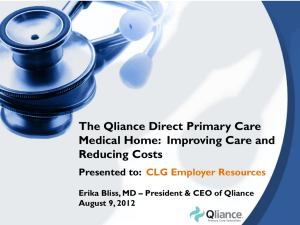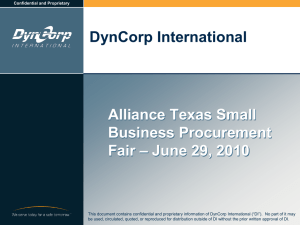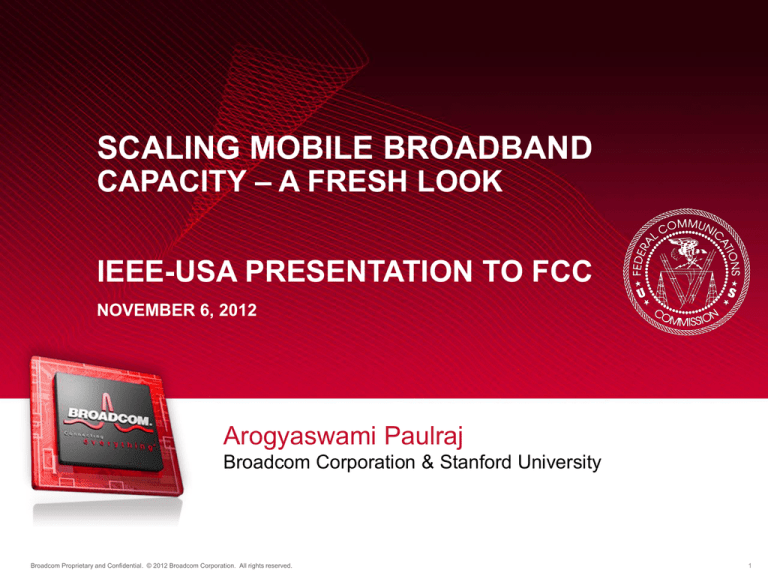
SCALING MOBILE BROADBAND
CAPACITY – A FRESH LOOK
IEEE-USA PRESENTATION TO FCC
NOVEMBER 6, 2012
Arogyaswami Paulraj
Broadcom Corporation & Stanford University
Broadcom Proprietary and Confidential. © 2012 Broadcom Corporation. All rights reserved.
1
BROADCOM CORP. AND PRESENTER INFO
Broadcom Corporation
Arogyaswami Paulraj
Headquartered in Irvine, CA
Sr. Advisor to Broadcom Corp.
A global leader in semiconductors
for wired and wireless
communications
Professor (Emeritus), Stanford
University
~ 11,200 staff worldwide
75 design centers globally
2011 net revenue of $7.39 billion
Broadcom Proprietary and Confidential. © 2012 Broadcom Corporation. All rights reserved.
2
WIRELESS – CONNECTING EVERYTHING
Broadcom Proprietary and Confidential. © 2012 Broadcom Corporation. All rights reserved.
3
MOBILE BROADBAND
DRIVERS
Richer Media
Lower Latency
Higher Network Capacity
Greater User Density
Service Criticality
Higher Availability Expectation
Higher Areal Reliability
Greater Geographic Penetration
Broadcom Proprietary and Confidential. © 2012 Broadcom Corporation. All rights reserved.
4
MOBILE BROADBAND
DEMAND GROWTH
Traffic Relative to 2009
Industry Forecasts of Mobile Data Traffic
Cisco
Coda
Yankee Group
Average
80% CAGR
Broadcom Proprietary and Confidential. © 2012 Broadcom Corporation. All rights reserved.
Source: FCC, October 2010
5
GROWING NETWORK CAPACITY
Capacity
(BPS / Sq. Mile)
=
Spectrum x Spectrum
(Hz)
Efficiency
x
No. of Cells
/ Sq. Mile
(BPS / Hz / Cell)
Broadcom Proprietary and Confidential. © 2012 Broadcom Corporation. All rights reserved.
6
ADD MOBILE SPECTRUM
Capacity
(BPS / Sq. Mile)
=
Spectrum x Spectrum
(Hz)
Efficiency
x
No. of Cells
/ Sq. Mile
(BPS / Hz / Cell)
FCC Goal:
300 MHz by 2015 and additional 500 MHz by 2020 in the
“mobile” bands – optimistic ??
Allocating spectrum
Exclusively licensed
Shared Rights
Unlicensed
Broadcom Proprietary and Confidential. © 2012 Broadcom Corporation. All rights reserved.
7
WHAT CAN SPECTRUM BUY?
Signal (Power per Hz)
Bandwidth
x Log (1 +
BPS / User = (Hz)
)
Noise (Power per Hz)
At low SNRs (typical), we cannot increase BPS / User by adding
bandwidth without proportionally adding power
Uplink:
Power in handsets already at Max (SAR) – so more spectrum mainly
buys more users, unless we shrink cell size or add antennas
Downlink:
Power in BS is not at max (as yet) so
more spectrum allows scaling BPS/user
and number of users
Broadcom Proprietary and Confidential. © 2012 Broadcom Corporation. All rights reserved.
8
MORE SPECTRUM EFFICIENCY
Capacity
(BPS / Sq. Mile)
=
Spectrum x Spectrum
(Hz)
Efficiency
x
No. of Cells
/ Sq. Mile
(BPS / Hz / Cell)
1.36-1.5
1.5
1.08-1.29
1.0
0.72
0.48
0.5
0.03
0.09
GPRS
EDGE
0.16-0.24
0.0
WCDMA
HSDPA,
Rel 5
HSPA,
Rel 6
Better reuse, adaptive modulation
Broadcom Proprietary and Confidential. © 2012 Broadcom Corporation. All rights reserved.
HSPA,
Rel 7
LTE
Early MIMO
9
ADD CELLS
Capacity
(BPS / Sq. Mile)
=
Spectrum x Spectrum
(Hz)
Efficiency
x
No. of Cells
/ Sq. Mile
(BPS / Hz / Cell)
Challenges in adding cells
High CAPEX + OPEX costs
(US cell growth 7-8% recent years)
Zoning / access
Backhaul: Fiber is prohibitive
in some areas, DSL/Cable do not
scale (500 MBPS/Cell), small cell radio back haul faces many
technology issues
Broadcom Proprietary and Confidential. © 2012 Broadcom Corporation. All rights reserved.
10
MOBILE BROADBAND
CAPACITY GROWTH TO 2017
Cell Type
Add Cells
Macro
+ 50 %
Add Spectrum
(Low Band)
+30%
Outdoor
Micro-Pico
Indoor
+ 400%
Add Spectrum
Efficiency
+50%
- MIMO
- CoMP
- Higher QAM
- ICIC
Covered by Indoor Networks
x10 capacity growth – optimistic
Broadcom Proprietary and Confidential. © 2012 Broadcom Corporation. All rights reserved.
11
A New Approach
12
Range
Km.
2.0
Rx Aperture
Sq. M
1.0
Tx Aperture
Sq. cm
Frequency
GHz
FREQUENCY VS. RANGE (FIXED APERTURE)
1
1
1
0.25
0.25
0.5
0.25
1
1
1
1
2
Broadcom Proprietary and Confidential. © 2012 Broadcom Corporation. All rights reserved.
UPLINK
13
No. of Rx
Antennas
Capacity
Mbps
1.0
No. of Tx
Antennas
Frequency
GHz
FREQUENCY VS. CAPACITY (FIXED APERTURE)
1
1
1
1
4
4
4
4
8
UPLINK
2.0
Broadcom Proprietary and Confidential. © 2012 Broadcom Corporation. All rights reserved.
14
HYPER MIMO (H–MIMO)
Adding Antennas
Current (Small) Aperture
Higher Frequency Band
Broadcom Proprietary and Confidential. © 2012 Broadcom Corporation. All rights reserved.
Current (Low) Frequency Band
Larger Aperture
15
ATTENUATION LOSS – HIGH BAND
Attenuation Loss from Atmosphere, Rain and Foliage is
Acceptable in Small Cells
Atmospheric
Rain
Foliage
Weissberger’s Mode
Broadcom Proprietary and Confidential. © 2012 Broadcom Corporation. All rights reserved.
where,
L = The loss due to foliage (dB)
f = The transmission frequency (GHz)
d = The depth of foliage ‘’’along’’’ the path (m)
16
H-MIMO PROPAGATION – HIGH BAND
High shadowing and low diffraction – so only LOS or
Near LOS propagation will work – ball parks
Foliage loss is manageable with “look down” rather than
“look through” deployments
Small cells keeps atmospheric and rain loss manageable
Handset antennas can be switched to avoid hand / head
shadowing
Broadcom Proprietary and Confidential. © 2012 Broadcom Corporation. All rights reserved.
17
H-MIMO: ANTENNA AND RF HARDWARE
Long history in military radar
applications
Wi-Fi 802.15c and .11ad already
building multi element arrays
Broadcom, IBM, Cybeam, …
have built low-cost integrated
array modules
Low band large aperture arrays
need multi-use models – bill
boards, architectural structures
16 element Active Array
802.15c
Low cost high band RF array technology is possible
Broadcom Proprietary and Confidential. © 2012 Broadcom Corporation. All rights reserved.
18
H-MIMO: BASEBAND AND NETWORK COMPLEXITY
With Multi-User(MU)-MIMO, a 50 user baseband
complexity is lower than Single User 4x4 MIMO
Other layer 2 and 3 technologies are no different from
current systems – data rates are just scaled up
But strong shadowing will require rapid multi-cell
coordination
Broadcom Proprietary and Confidential. © 2012 Broadcom Corporation. All rights reserved.
19
H-MIMO: SMALL APERTURE – HIGH BAND
Use Case: Elevated base station antenna array, small cell,
for high density outdoor pedestrian subscribers
Scale up frequency by Kf
No. of BTS antennas up by Kf2
No of handset antennas 1 (or more)
Technology – MU-MIMO
Capacity scales by Kf2
Range unaffected
(ignoring absorption loss)
Broadcom Proprietary and Confidential. © 2012 Broadcom Corporation. All rights reserved.
20
H-MIMO: LOW BAND – LARGE APERTURE
Use Case: Large array base stations for nomadic
and vehicular subscribers
Aperture = Ka times wider and taller
No. of BS antennas up by Ka2
No. of handset antennas 1 (or more)
Technology – MU-MIMO
Capacity scales by Ka2
Range “doublings” = log (Ka2)
Broadcom Proprietary and Confidential. © 2012 Broadcom Corporation. All rights reserved.
21
LOW BAND – LARGE APERTURE
(MOBILE STATION)
Use Case: Vehicular subscribers in macro cell environment
No of vehicular antennas = N
Technology – Up Link and Down
Link beam forming
Range “doublings” = log (N)
Technology – MU-MIMO / COMP
Capacity scale up by x10 ?
Broadcom Proprietary and Confidential. © 2012 Broadcom Corporation. All rights reserved.
22
H-MIMO REGULATORY ISSUES
New spectrum allocation in high bands for “mobile” use
Spectrum licensing models in high bands – exclusive,
shared, unlicensed
RF bio-safety in high and low bands
High gain beam forming increases EIRP
Multi-User MIMO – multiple beams
Near field
Base station zoning in low bands (for physically large
arrays)
Broadcom Proprietary and Confidential. © 2012 Broadcom Corporation. All rights reserved.
23
MOBILE BROADBAND POTENTIAL
CAPACITY GROWTH 2017 – 2022
Cell Type
Add Cells
Add Spectrum
Add Spectrum
Efficiency
Low band
High Mobility
+ 50 %
+30%
+100%
Vehicular
Backhaul
High band
Low Mobility
+ 50%
150%
+10,000%
H-MIMO
Outdoor
x500 capacity
Broadcom Proprietary and Confidential. © 2012 Broadcom Corporation. All rights reserved.
24
SUMMARY
Mobile broadband capacity will severely lag demand if
we rely only on current approaches
Huge capacity gains can come from H-MIMO
Needs significant spectrum, regulatory and technology
initiatives
Broadcom Proprietary and Confidential. © 2012 Broadcom Corporation. All rights reserved.
25
Thank You
26


